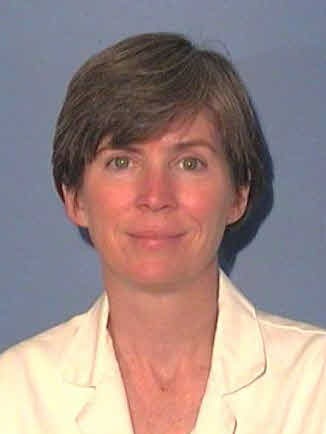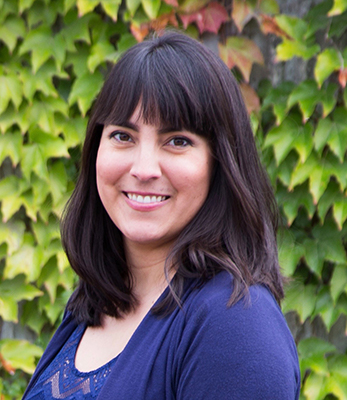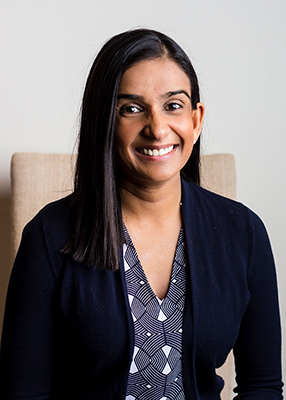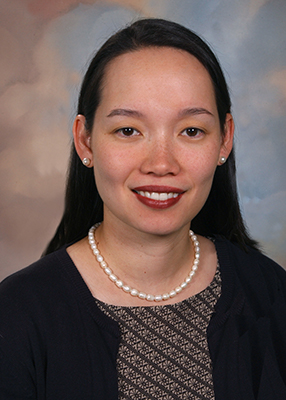Celebrating Women in Medicine Month
September is Women in Medicine Month! In honor of this special month, the Department of Internal Medicine recognizes a few select women faculty members from various division and career lines. Read on to get to know these tremendously talented women faculty members.
 Barbara C. Cahill, MD
Barbara C. Cahill, MD
Professor
Division of Respiratory, Critical Care and Occupational Pulmonary Medicine
1. Why did you choose to enter a career in medicine?
"I was drawn to medicine for the chance to work in a field dedicated to caring for humanity's ills, a field that was innovative, always on the move, intellectually stimulating and full of amazing people."
2. What is your favorite part of your job?
"I enjoy the variety of challenges, the unpredictable nature of a fully scheduled day, and the questions that present themselves in my profession."
3. How can women physicians/researchers best support fellow women physicians/researchers in the medical/healthcare field?
"We need to remember that our colleagues, men and women alike, bring personal challenges and stressors to work that we know not of. We support one another by interacting with kindness and an emotionally supportive mindset."
4. What advice do you have for women who may be applying to medical school or entering into this field for the first time?
"Medicine is an amazing profession: it will fulfill you, challenge you, make you a better person, and give you the opportunity to improve the lives of others."
April F. Mohanty, MPH, PhD
Research Assistant Professor
Division of Epidemiology
1. Why did you choose to enter a career in medicine?
"In high school I was very intrigued by science and liked that it was a challenge, but I wasn’t sure what career I wanted since no one else in my immediate family had pursued science or medicine. Between high school and college, I spent two summers doing poverty relief work (3 months each) in Tanzania and Haiti. I always knew I wanted to a career that would be about serving people. While on these trips I saw first-hand the impact that access to good healthcare could have on the quality of life of the individuals I met. A career in medicine was a natural fit given my curiosity in science and desire to work with and help communities."
2. What does a typical day in your work life look like?
"It depends on the day of the week. For instance, last Friday started at 6 am, I prepared a bottle for my 3 month old and her diaper bag for my husband to drop off at daycare. I got ready and met my colleagues for a 7 am breakfast to discuss potential collaboration opportunities on women’s research in the VA. From there I went to my VA office and prepared for my 8:30 am meeting with my Career Development Award (CDA) data manager to review data quality issues for our next paper. Around 9:30 am, I visited my 3 month old at her daycare to check on her since she is still learning to use a bottle. At 10:15 am, I headed home to send out some emails, have lunch and take a call with a VA clinical provider to discuss shadowing opportunities relevant to my CDA. At 1:00 pm, I met with a statistician colleague for a couple of hours who is helping me analyze data for another manuscript. At 3 pm I went back the daycare to check on my 3 month old. From 4-5 pm, I met with colleagues to network and socialize; one highlight was celebrating our manuscript that was accepted earlier that week for publication. At 5:15 pm I picked up my 3-year-old from her daycare since she had asked me several times to do this and usually my husband picks her up. I look forward to Fridays since I get to have many in-person interactions with my research team and colleagues. However, since Fridays are often meeting heavy being fully present can be challenging and by the end of the day I am pretty wiped out. It’s nice to have the weekend to recover."
3. In your own words, what does it mean to be a woman in healthcare? Do you face any unique challenges because you are a woman? How do you overcome these challenges?
"To be a woman in the medical/healthcare field I feel a sense of responsibility in my scholarly work, service activities and as a mentor/educator to raise and to try to address issues related to gender equality. So many male and female mentors have believed in me and inspired me along my career path. It is an honor to be at a career stage where I can join my colleagues in paying it forward!
One of the unique challenges I currently face as a mother to a 3-year-old and a 3-month-old, is carving out time for deep uninterrupted thinking. I have had to reorder my work routine realizing that the best time to concentrate is often at night while the kids are sleeping. Thank goodness my 3-month old is a champion sleeper (for now at least)!"
4. What advice do you have for women who may be applying to medical school or entering into this field for the first time?
"Among the top pieces of advice is to carefully select your mentorship team. Particularly as someone entering in the medical field, mentors have been vital to my career and career vision. I have found that I benefit from a mentor team, where each mentor uniquely contributes to needs (e.g. sponsorship, resources, emotional wellbeing, accountability) and provides guidance (e.g. subject matter expertise, professional development, work-life integration guidance). I also appreciate having mentors who span a range of career stages from my peer mentors to more senior mentors. As with being a caregiver, being an early stage investigator can be isolating, it takes initiative and time to build the relationship support needed to be successful."
 Rashmee U. Shah, MD
Rashmee U. Shah, MD
Assistant Professor
Division of Cardiovascular Medicine
1. What does a typical day in your work life look like?
"My typical day is highly variable. One fourth of my time is spent in clinical work and 3/4 of my time is spent doing research. I like to get to the hospital as early as possible, usually before 7 am. On my clinical days, I start evaluating or seeing patients early and will often stay past 5 or 6 pm. In cardiology, we can have unexpected situations or emergencies, so if I need to stay late, then that's what I do. On research days, I am most productive in the morning. I spend a lot of time writing. My research involves data science and computer science, so made in later in the day I'll work on some programming. My days are interspersed with conference calls and in-person meetings. One challenge with research is the lack of structure. In the clinical job, the task is clear calling you have a list of patients to see, a list of notes to finish, a list of calls to make. In research, it's up to you to dream up the project and how to get there."
2. What is your favorite part of your job?
"While lack of structure is a challenge, it's also the favorite part of my job. I get to do whatever I want in my research time. I can dream up projects big and small, and my division has given me the freedom to explore those opportunities. So it's not a challenge, it's an opportunity. I did not find this kind of creativity in the clinical work, but the clinical work is an excellent complement to the research work. And vice versa."
3. Describe your favorite work-related memory - a memorable patient, a surprise you discovered in your research, etc.?
"This is a tough question, because I get a favorite work-related memory every week. Working with residents is fantastic and traveling to meet colleagues to present my work is also very energizing. I work with a lot of really smart people and that is incredibly fulfilling and helps me grow as an investigator, clinician, and person."
4. What advice do you have for women who may be applying to medical school or entering into this field for the first time?
"Aim high. The people who succeed are the people who stay in the game the longest. This career is a marathon, not a sprint. If you stick with it, you will get success and develop a thick skin. Be a little bit selfish. It's okay to make sure your efforts are benefiting you and not someone else, especially early in your career. The things you work on, for the most part, should end up as something tangible on your CV. And finally (because I find the conversation often goes in this direction) it's okay for someone else to watch your kids, get your groceries, and clean your house. Most of that stuff is not fun anyway, but advancing your career and creating change in medicine is incredibly fun."
 Theresa L. Werner, MD
Theresa L. Werner, MD
Associate Professor
Division of Oncology
1. Desribe your favorite work-related memory - a memorable patient, a surprise you discovered in your research, etc.?
"Just recently one of the clinical trials in ovarian cancer that I was the Principal Investigator for here announced positive results in the treatment of newly diagnosed ovarian cancer which will be practice changing. Telling the dedicated brave patients of mine that their participation helped changed the way we will take care of all ovarian cancer patients to come was amazing. Many had tears in their eyes to know that they did something so important for someone else who would be diagnosed with ovarian cancer. "
2. In your own words, what does it mean to be a woman in the medical/healthcare field? Do you face any unique challenges because you are a woman? How do you overcome these challenges?
"I think it’s amazing to be a woman in medicine today. I think back to when woman didn’t even go to medical school and I see how far we have come though we still need to improve on the number of women in leadership positions. There is something unique that a woman, mother, wife, sister, daughter brings to the table in healthcare. I work in women’s health so I really see how the woman patient to woman physician relationship is beneficial. I think the work life balance is a common struggle for women in medicine. It’s something I have to work at every day because I have two young children and I want to make them and me a priority and yet still be the best doctor I can be."
3. How can women physicians/researchers best support fellow women physicians/researchers in the medical/healthcare field?
"I think mentoring and coaching of other women coming up through the medical professions is important. It’s easy to relate to someone who has similar struggles that you have. I am reading Melinda Gates’ book “The Moment of Lift” and it’s about empowering women, and when we lift woman up, we lift up all humanity. Pretty powerful!"
4. What advice do you have for women who may be applying to medical school or entering into this field for the first time?
"Find someone to talk to about what it was like for them. Asking those who came before you can help with lessons learned and keys to success. And we love to share and help out. I mentor many students and trainees in medicine and it’s one of the things I love about working in medicine the most. I get to help patients and also the future generation of women in medicine. It’s an honor and a privilege to be able to do that, truly."